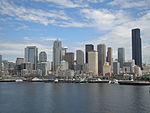Fairmont Olympic Hotel
Downtown SeattleEmporis template using building IDFairmont Hotels and ResortsHistoric Hotels of AmericaHotel buildings completed in 1924 ... and 6 more
Hotel buildings on the National Register of Historic Places in Washington (state)Hotels established in 1924Hotels in SeattleNational Register of Historic Places in SeattleUnited Hotels Company of AmericaUse mdy dates from February 2020

The Fairmont Olympic Hotel, originally The Olympic Hotel, is a historic hotel in downtown Seattle, Washington. It was built on the original site of the University of Washington's first campus. The hotel opened in 1924, and in 1979, it was added to the National Register of Historic Places.
Excerpt from the Wikipedia article Fairmont Olympic Hotel (License: CC BY-SA 3.0, Authors, Images).Fairmont Olympic Hotel
University Street, Seattle First Hill
Geographical coordinates (GPS) Address Website External links Nearby Places Show on map
Geographical coordinates (GPS)
| Latitude | Longitude |
|---|---|
| N 47.608011 ° | E -122.334548 ° |
Address
Fairmont Olympic Hotel
University Street 411
98101 Seattle, First Hill
Washington, United States
Open on Google Maps











